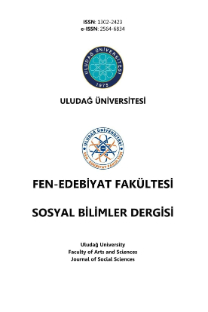Martin Hidegger Felsefesinde Ölüm Problemi
___
- Akarsu, Bedia (1994). Çağdaş Felsefe. (3. b.). İstanbul: Inkilap Kitabevi.
- Besnier, Jean-Michel (1993). Histoire de la Philosophie Moderne et Contemporaine.(T.2). Paris :Eds.Grasset – Fasquelle.
- Bozkurt, Nejat (1998). 20.Yüzyıl Düşünce Akımları. (2. b.). İstanbul: Sarmal Yayınları.
- Choron, Jacques (1969). La Mort et la Pensée Occidentale. Paris: Payot.
- Corvez, Michel (1961). La philosophie de Heidegger. Paris: P.U.F.
- Çüçen, A. Kadir (1997). Heidegger’de Varlık ve Zaman. Bursa: Asa Kitabevi.
- Dastur, Françoise (1994). La Mort. Paris: Éd. Hatier.
- Dreyfus, H. (1978). Heidegger and Modern Philosophie. Critical Essays, Edited by. Michael Murray, New Haven and London:Yale University Pres.
- Echeverria, José (1957). La Mort et Le Problème du suje. Paris : Ed. J. Vrin.
- Granel, Gérard (1979). Remarques sur l’accès à la pensée de Martin Heidegger: Sein und Zeit in La Philosophie au XXe Siécle. (T.4). Belgique: Eds. Marabout.
- Gurvitch, G. (1949). Les Tendances Actuelles de la philosophie Allemande. Paris: LibrJ.Vrin.
- Haar, Michel (1990) . Heidegger et l’essence de l’homme.Grenoble: Eds. J. Million.
- Heidegger, Martin (1996). L’Etre et Le Temp., Paris: Eds. Gallimard. (1960) Was ist Metaphysik. (8. Ed.). Francfort.
- Heidegger, Martin (1983) Lettres sur l’humanisme. Paris : A. Montaigne.
- Heidegger, Martin (1990) Questions III. Paris: Eds. Gallimard.
- Jaffro, Laurent; Labrune, Monique (1994). Gradus Philosophique, Paris: Eds. GF-Flammorion.
- Jankelevitch, Vladimir (1997). La Mort. Paris : Flammorion.
- Karakaya, Talip (2000). Çağdaş Felsefi Düşünceler. Isparta: Fakülte Kitabevi Yayını.
- Lévinas, Emmanuel (1991). La Mort et le Temps. Paris : Eds. de l’Herne.
- Magill, Frank (1992). Egzistantialist Felsefenin Beş Klasiği (Çev: Vahap Mutal, 2. b.). İstanbul: Dergâh Yayını.
- Mulhall, Stephen (1998). Heidegger ve Varlık. ( Çev: Kaan Öktem). İstanbul: Sarmal Yayını.
- Özlem, Doğan (1997). Günümüzde Felsefe Disiplinleri. İstanbul: İnkılap Kitabevi.
- Pöggeler, Otto (1967). La pensée de Martin Heidegger. Paris: Ed. A. – Montaigne.
- Rioux, B. (1963). L’Etre et La Vérité chez Heidegger et St. Thomas D’Aquin. Paris: P.U.F.
- Salanskis, Jean-Michel (1997). Heidegger. Paris :Eds. Les Belles Lettres.
- Sallis, John. La Mortalité et L’imagination in Le Cahier. Paris : Eds. Osiris.
- Sartre, Jean-Paul (1946). L’existentialisme est un humanisme . Paris : Eds. Nagel.
- Schérer, R.; Kelkel, A. L. (1973). Heidegger . Paris: Eds. Seghers.
- Soykan, Ö. Naci (1999). “Varoluş Yolunun Ana Kavşağında”, Doğu-Batı Dergisi, Şubat-Mart-Nisan.
- Waelhense, A. de. La philosophie de Martin Heidegger. Louvain : Eds. De L’Institut Supérieur de philosophie.
- Wahl, Jean (1998). Introduction à la pensée de Heidegger. Paris: Libr. Gén. Française. (1999). Martin Heidegger’de İnsan Realitesinin Atılmış Varlık Olması. (Çev: Talip Karakaya). S.D.Ü., İlahiyat Fakültesi Dergisi. Sayı: 4, Isparta 1999, s.173-183.
- ISSN: 1302-2423
- Yayın Aralığı: 2
- Başlangıç: 1999
- Yayıncı: Bursa Uludağ Üniversitesi
XVI. Yüzyıl Divan Şâiri Fedâyî ve Fâl-Nâme-i Kur'ân-ı' Azîm'i
Martin Hidegger Felsefesinde Ölüm Problemi
Rus Eleştiri Tarihinde F.M. Dostoyevski
Osmanlı Döneminde Mahalle ve İşlevleri
Halide Edib Adıvar, Yakup Kadri Karaosmanoğlu ve Falih Rıfkı Atay'ın Kalemiyle Savaş ve Çocuklar
Osmanlı Döneminde Bursa'da Eytâm Keseleri
Leadership Perspectives on Turkey's Accession to the European Union
